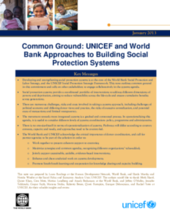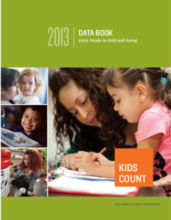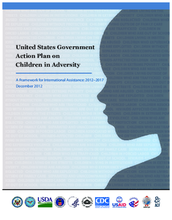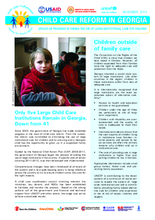Displaying 271 - 280 of 461
This brief outlines the common ground between the World Bank and UNICEF in their commitment in developing and strengthening social protection systems and calls on other stakeholders to engage collaboratively to build such systems and expand their coverage.
The 2013 KIDS COUNT Data Book provides a detailed picture of how children are faring in the United States. In addition to ranking states on overall child well-being, the Data Book ranks states in four domains: Economic Well-Being, Education, Health, and Family and Community.
The Action Plan on Children in Adversity is the first government wide strategic guidance for U.S. Government international assistance for children. The goal of the Action Plan is to achieve a world in which all children grow up within protective family care and free from deprivation, exploitation, and danger. It has three principal objectives, with Objective 2 specifically focusing on the importance of promoting family care and prevention of family-child separation.
This policy brief from the World Bank provides an overview of cash transfers in African countries.
The document highlights the recent child care reform in Georgia under the partnership of the Ministry of Labor, Health, and Social Affairs of Georgia and UNICEF and provides an update on progress of ending the use of large institutions care for children.
This paper provides insight into child protection in the context of coordinated action, the architecture of U.S. government assistance, the state of evidence-base, development of appropriate research framework, practice and policy, ethical considerations, and capacity development and knowledge transfer for those advocating for children outside of family care. Recommendations are made to consider how current operational contexts, collaborative relationships and learning-knowledge can be united to focus on the various categories of children outside of family care.
This article reviews the available evidence regarding the efficacy, effectiveness, ethics, and sustainability of approaches to strengthen systems to care for and protect children living outside of family care in low- and middle-income countries.
This article reviews the U.S. Government Evidence Summit on Protecting Children Outside of Family Care held in December 2011 in Washington D.C. The Summit brought together more than 150 of the world’s leading advocates for children to examine the strength of the research evidence on existing programs and interventions, and most importantly to identify critical knowledge gaps and areas where more research is needed so that systems and programs designed to improve the overall health and well-being of these vulnerable children may be strengthened.
The purpose of this review was to identify evidence-based early response strategies and interventions for improving the outcomes of children outside of family care, including children of and on the street, institutionalized children, trafficked children, and children affected by conflict and disaster, and who are exploited for their labor. A conclusion was drawn that there is a strong need for strengthening the evidence base regarding the effectiveness or early assessments and responses to children living outside family care and for using evidence to guide operational policy and practice.
This paper reviews the various methodologies applied to identify and enumerate these often hidden and/or mobile populations. Methodologies that identify and enumerate children outside of family strive to meet two objectives: (1) to estimate the number and characteristics of a specific vulnerability category and (2) to determine eligibility to receive services. Conclusions from these reviews advocate for tailoring a methodology to the specific circumstances under which it is meant to identify or enumerate children outside of family care.





